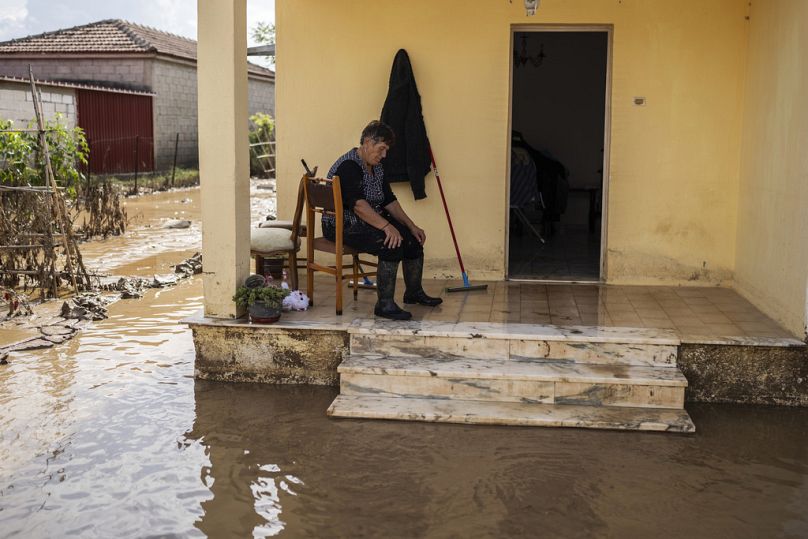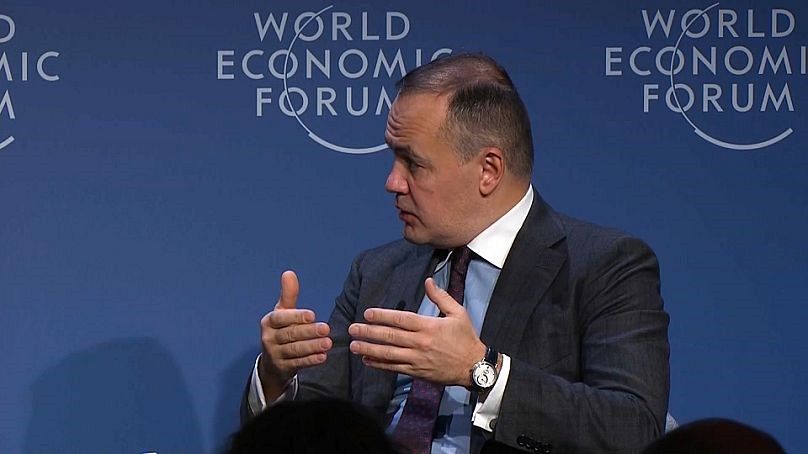What is ahead for the European Green Deal, the EU's roadmap towards a sustainable net-zero economy, as it faces political headwinds in the run-up to the 2024 European elections?
In a bid to make Europe climate-neutral by 2050, the European Commission has rolled out landmark green legislation and aims to mobilise at least €1 trillion in sustainable investments over the next decade.
 ADVERTISEMENT
ADVERTISEMENT
 ADVERTISEMENT
ADVERTISEMENT
However, the deal has hit some roadblocks with mounting opposition from conservative lawmakers and some in the construction, agricultural and energy sectors, as the Commission races to meet its interim targets.
So, what does the future hold for the European Green Deal?
This is what Euronews Correspondent Sasha Vakulina asked Kyriakos Mitsotakis, the Prime Minister of Greece; Maroš Šefčovič, the Vice-President of the European Commission; Ester Baiget, the President and CEO of Novozymes, Denmark, and Maksym Timchenko, the CEO of DTEK, Ukraine, at the World Economic Forum in the Swiss resort of Davos last week.
‘European Green Deal, anyone?’
The Greek Prime Minister highlighted his enthusiasm and continued support for the Green Deal, referencing the catastrophic floods that devastated parts of central Greece in September 2023.
“Since then, we've had a geopolitical shock, and it has also been incredibly clear that some of the solutions offered by the Green Deal make profound economic sense,” he said.
Greece has made significant progress in reducing its greenhouse emissions and boasts an increasing number of renewable energy technologies but according to the European Commission's Vice-President Šefčovič, Europe, as a whole, still has a long way to go in preparing for a carbon-neutral future.
"The Prime Minister knows very well that very often we cannot maximise our wind and solar power potential, we have so-called curtailment because our grids are not able to carry the electricity to the final consumers.
"Because the grids don't have that capacity or because we lack enough interconnectors in Europe... we really need to make sure that we invest in the grids and build them to be ready, not for the next year, but to be ready for the climate-neutral future for 2050" added Šefčovič.
The Slovakian diplomat also relayed Brussel’s optimism for the future of the Green Deal: "I am bullish... I am in a category which, I understand, is described by the political scientists as a "happy warrior". Being in this business, you have to be optimistic because you see what kind of distance we have already covered.”
Ester Baiget also shared her opinions with Euronews from a purely business perspective, she was also optimistic, stating the Green Deal "is moving us all in the right direction."
"There is a strong dependence [on] the fossil base that we cannot simply ignore. Then, investments need to be for the future. Every single investment needs to be for green energy. For solar, for wind, for methane, for Power-to-X, injecting the cash, the investments, these precious dollars, these precious euros, on the solutions of the future.
"Same for food, for agriculture, investment in regenerative agriculture, investments in plant-based protein… this should be a gradual move and that will generate growth and that will generate jobs".
What does the Green Deal mean for Europe?
The Green Deal was implemented by the current administration to help Europe transition into a resource-efficient economy and tackle climate change, reduce dependency on fossil fuels, increase food security and ultimately, generate net-zero carbon emissions by 2050.
It contains goals for the energy, mobility, agricultural and construction sectors with intermediate targets set for 2030. The Fit for 55 legislative package precisely defines the actions required to achieve the 2030 target.
The Commission vowed to mobilise €1 trillion over a ten-year period to help Europe transition and to ensure that no member state is left behind in the process. This money will be taken from the NextGenerationEU Recovery Plan, the EU budget as well as grants from public and private investors.
But, according to Brussels, the EU will still need to invest €1.5 trillion per year between 2031 and 2050 if the bloc is to reach its ultimate goal. One milestone is for the member states to slash their emissions by 55 per cent of 1990 levels before 2030.
Who is making progress?
Preliminary calculations made by the Agora Energiewende think tank in early January suggest CO2 emissions across Germany have already dropped by 73 million metric tonnes, compared to 2022's figures - the lowest levels seen since the 1950s.
In addition, the think tank reported that renewable energy sources accounted for more than half of the country's energy production in 2022 while electricity production using black coal has also dropped to 8.9% from 12.8%.
Despite these wins in Germany, some industrial sectors and businesses, as well as the farming community, feel that complying with the EU's environmental regulations is too difficult in the wake of inflation and rising energy prices as a result of Russia's full-scale invasion of Ukraine. This has in turn fuelled climate-sceptic parties predominately on the right in their calls for a pause in environmental legislation who argue that the net-zero transition away from fossil fuels is too costly.
In the face of political headwinds, the EU has vowed to charge on towards its goal but, with the European elections on the horizon, it has become evident that public support is key for the future survival of the Green Deal.
"When you want to build public support, start with the obvious win-win solutions" advised Prime Minister Mitsotakis, "and be very careful with agriculture, because agriculture on its own is a very, very complex topic. It's very difficult to decarbonise. And, we need to be very sensitive when it comes to reactions from our farmers."
Balancing transition against targets and energy security
Maksym Timchenko, the CEO of DTEK, Ukraine's largest private energy investor, also weighed in: “We are in a situation where we have to balance coal mining and coal power generation, playing a crucial role in national security, at the moment.
"We have thousands of coal miners working in Ukraine, at the moment. On the other side, Ukraine is committed to following all standards and regulations coming from Europe. So, for us, it's extremely important that it's done in a fair way for the next ten years”
According to Prime Minister Mitsotakis, the future of energy security is clear. "In the short term, we want to be an energy provider for at least the Balkans, by building strong interconnections, pipelines, floating storage and regasification units in northern Greece, leverage our unique, geographic potential, possibly even, if necessary, export gas up to Ukraine because, if you actually look at the map, the distance is not that far," he said.
“Part of our medium- to long-term plan is to really make a breakthrough when it comes to offshore wind. But, in order to do that, we also need to build the necessary interconnections" he said.
Watch the full interview in the media player above












